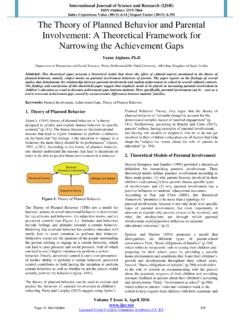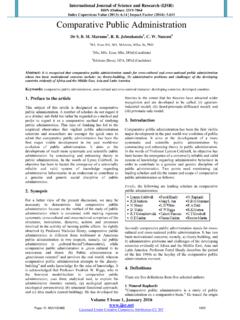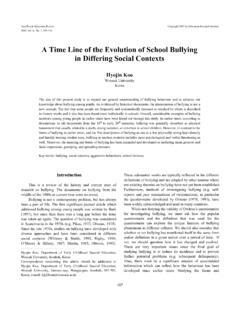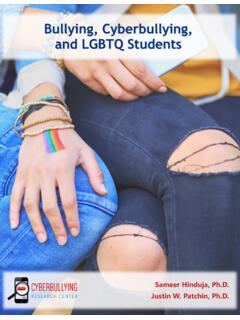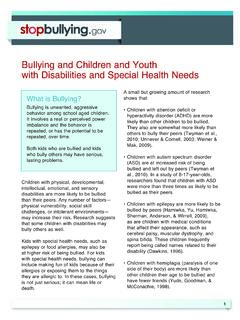Transcription of Effect of Single Parent Family on Child Delinquency
1 International Journal of Science and Research (IJSR) ISSN (Online): 2319-7064 Impact Factor (2012): Volume 3 Issue 9, September 2014 Licensed Under Creative Commons Attribution CC BY Effect of Single Parent Family on Child Delinquency Archana Singh1, Dr. Kiran2 1 Research scholar, Department of HD & FS, School for Home Science, Babasaheb Bhimrao Ambedkar Central University, Lucknow 226025, Uttar Pradesh India. 2 Assistant professor, Department of HD & FS, School for Home Science, Babasaheb Bhimrao Ambedkar Central University, Lucknow 226025, Uttar Pradesh India. Abstract: This paper reviews the interrelationship among Family structure, and Child Delinquency . This paper attempts to explain the Effect of Family structure on juvenile Delinquency . The least amount of communication and structure of the Family may be some of the reasons which provides, the more likely make the Child will engage in delinquent activities.
2 Patterns of Family behavior, decision making and Family structure have a significant Effect on Child behavior. Family structure including two Parent families: Single mother families, Single father families, and step families. The findings suggest that Family structure does indeed both negatively and positively play a role leading to juvenile Delinquency . Keywords: Behavior, Family structure, juvenile Delinquency . 1. Introduction Crime happens anywhere in this world and it excuse no one, where rich or poor, adults to youth and juveniles. Juvenile Delinquency youth violence in schools and outside of schools is an issue that is damaging the whole world. It is not something that is happening recently it is happening for a long period of time. Juvenile Delinquency known as juvenile offending, or youth crime, is participation in illegal behavior by juveniles.
3 A juvenile delinquent is a person who is typically under the age of 16 and commits an act that otherwise would have been charged as a crime if they where an adult. In other words we can say juvenile delinquents are offenders including boys and girls who are normally under 16 years of age. What are the reasons which provoke a Child to become delinquent and what makes the Child gravitate so easily towards this life style. Family structure is found to be one of the prominent factors in provoking delinquent behavior. Children from divorced families were more likely to indulge in delinquent behavior in all domains except alcohol usage. As divorce rate continue to rise, it is necessary that society has to be aware of any effects that may have on children and adolescents in the Family According to Wright and Wright (1994) the Family is the foundation of human society.
4 Children who are rejected by their parents, who grow up in homes with considerable conflict or who are inadequately supervised are at the greatest risk of becoming delinquent. Boys from Single parents families are expected to involve in more delinquent behavior than boys from any two Parent Family structure. There are various reasons which promote Delinquency characteristic in children which include Child has criminal parents the severity of discipline administered to a Child parental neglect and abuse, inadequate parental supervision domestic violence age of parents at time of Child s birth , parental attitudes towards violence, parental drug use history of mental illness, birth order size of Family , parents education, socioeconomic status and parents Child separation A negative Family characteristic such as poor parental supervision is often studied as a risk factor for future Delinquency or crime and children who come from such homes are believed to be at greater risk or are more likely to commit offenses than children who do not.
5 Families are one of the strongest socializing forces in life. They teach children to control unacceptable behavior, to delay gratification, and to respect the rights of others. Antisocial and aggressive behaviors may begin as early as preschool or in the first few grades of elementary school. Family is very important in creating a law abiding Child . 2. literature review This review paper will address the influence that a Single Family home has on the Child . Parents separation and divorce has a tremendous Effect on children. Observation in Single Parent homes have illustrated children deviant acts are often ignored or not responded to correctly (Patterson, 1990) during separation in the home, the children can experience feelings of confusion, anger , and despair that can cause them to react in a way they might not have experience previously, Some studies find the relation between Family structure and gender differences in Delinquency .
6 Researchers illustrate that children from a Single Parent or step Family may have lower levels of control placed on them than children from a biological households. (Hagan 1990). It was brought to the attention that recent reports illustrated that youngsters living in stepfamilies homes were equally at risk for involvement in deviant behavior as those in a Single Parent setting (Society for Researching in Child Development, 1987) Children who live in homes with only one Parent or in which marital relationships have been disrupted by divorce or Paper ID: SEP1440866 International Journal of Science and Research (IJSR) ISSN (Online): 2319-7064 Impact Factor (2012): Volume 3 Issue 9, September 2014 Licensed Under Creative Commons Attribution CC BY separation are more likely to display a range of behavioral problems including Delinquency , than children who are from two Parent families (Thornberry et al.)
7 1999) Write and Write (1994) indicated that Single parents families and in particular mother only families produce more delinquent children than two Parent families indeed the very absence of intact families makes gang membership more appealing ( Muehlinberg 2002) . During separation in the home, the children can experience feelings of confusion, anger, and despair that can cause them to react in a way they might not have experience previousl y. Mishra and Kiran (2013) conducted a study on "Impact of ordinal Position On Self Concept Among Adolescents." With the objective to study the relationship between self concept and Parent adolescents relationship and concluded that the difference among parentally variable with self esteem. Acceptance, carelessness, protection, neglect, indulgence, utopian expectations, realism, lenient standard, moralism, freedom, discipline, faulty and marital adjustment effected the children's behavior.
8 Parental relationship is not only contributory factor of self esteem of the children in fact there are other contributory factors. Parent dissatisfaction with their own relationship may precipitate children's behavior problem. The emotional relationship between the parents was also a significant factor in deviance in children. 3. Causes of Child /Juvenile Delinquency Some of the most common causes of juvenile Delinquency are---- (1) Family :- Family is the basic socialization agency for the children . Children learn basic concepts about good and bad from their Family . Family can make or break the personality of the children . In the Family the most important role is played by the parents. Broken families, Single Parent families, separated families, frequent. Parents fight, lack of trust and confidence among the parents criminal parents can be the most important reasons behind juvenile Delinquency .
9 (2) Economic problem in Family :- The cause of juvenile Delinquency is economic problem in Family . They want to improve their status and for this purpose they use negative path. (3) Psychological problems in Family :- Mental illnesses or other psychological problems likes depression, frustration, aggression or hyper behavior showed by the parents can make the Child feel deprived and inferior among friends . (4) Peer group influence:- Peer group is very strong force that can cause delinquent behavior in the adolescents and children . Peer group rejection can also be the cause of juvenile Delinquency . (5) Drug use :- Drug use has become widespread among children boys and girls. Drug use in youth can be dangerous as they can commit violent crimes when they take drugs. 4. Remedies for Juvenile Delinquency The Family should have a positive attitude towards life and towards society.
10 The Parent should tell their children the consequence of breaking laws that government has made for public safety and betterment. Parents should make sure that they observe equality of rights, justice and condemn discrimination. From early childhood parents should ensure that their children meet people of their age and know how to behave in the society. Parents should create a healthy and friendly relationship with their children so as to ensure children feel free to share anything and everything with their parents. 5. Effect of Single Parent Homes on Child Delinquency Single parenting effects children mentally, emotionally as well as psychologically. Often times the Single working parents lacks Parent Child relationship because they lack adequate time to help their children deal with the frustration of having only one Parent present in the home.







